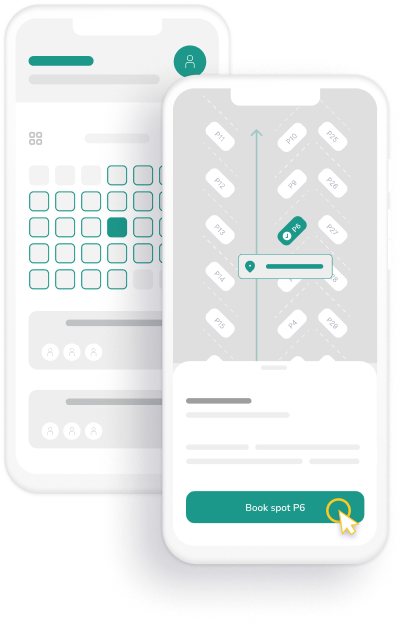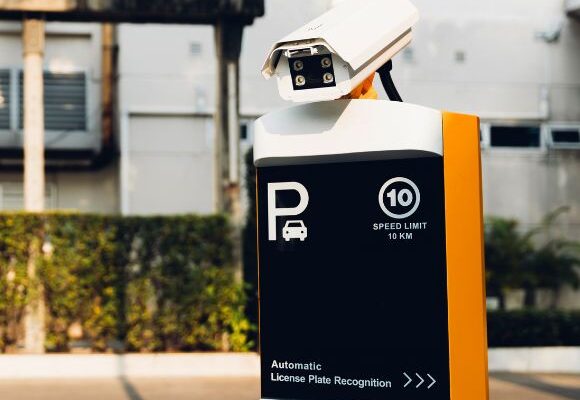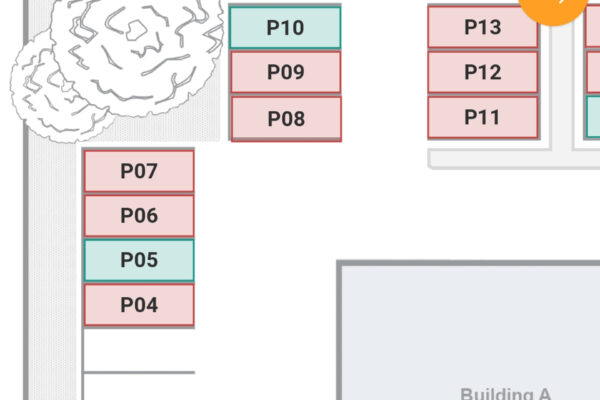Scheduling employees into parking spaces is a common practice in offices where there are more employees than spaces. At first glance, this is a fair way to allocate parking. However, it is quite possibly the most inefficient way to use parking spaces. Why? Human behaviour. In this post, we will explain why scheduling employees into parking spaces is a bad idea – unless you use a parking management system.
Scheduling employees
For many companies, scheduling employees into parking spaces each week seems like the fairest and most transparent way to manage office parking.
This way, each employee is given an equal opportunity to park onsite. Employees that are not scheduled into a parking spot will know they must park off-site or find another way to get to work.
Office managers and admins might use an excel sheet to manage the schedule. The schedule is then sent out to staff weekly or monthly. This method sounds seamless, right? That is until an employee decides to work from home on a day when they are scheduled into a parking space. Or an employee is on holidays, or an employee has phoned in sick.
The employee in each case has either forgotten or didn’t have time to let the admins know that they would not need their parking spot.
The result? Empty parking spaces outside the office. It might sound silly, but this empty parking spot can cause a company a lot of unnecessary problems. Let’s see what problems could occur.

Problems arising from empty spaces
Office parking inefficiency
The first problem that arises for the company is the inefficiency of their resources. Yes, 1 or 2 empty parking spaces in a day will not hurt the bottom line. 1 or 2 empty spaces every day, now that is different. Companies must pay to lease parking spaces for their office, especially in cities or towns. These parking spaces can vary in price, but taking a regular spot in Dublin, the cost to lease this space per year is approximately €5,000. If 2 spaces are empty for the whole year on average, that is €10,000 in wasted resources. To ensure that parking spaces are managed efficiently, companies who manually schedule employees will need to enforce stringent rules around employees not using their space. This will require employees to notify admins in advance so they can schedule someone else into this spot. However, this sounds like a lot of work to find someone who needs the parking space at short notice. Is there a better way? Most definitely, read on.
Frustrated employees
This is arguably the most difficult issue to deal with. The biggest problem with manual scheduling is that some employees choose not to use a parking space, and do not tell anyone else. This is just natural. When an employee goes home at night and decides, “I’m going to work from home tomorrow”, they are not thinking about emailing the admin, or texting the WhatsApp group to tell them about their parking space. However, the next morning, when an employee who was not scheduled into a spot, parks on the street nearby, pays €6 for all-day parking, walks to the office to see an empty spot in the car park – that is where the frustration begins. When there is parking onsite, employees should be able to avail of it. Even at short notice. A manual scheduling approach is not the way to do this.
Admins face the backlash
Once employees grow frustrated, they will begin to vent their feelings towards the office managers and admins. This will be in response to poor management of the office parking. However, as we have explained above, the problems arise due to human behaviour. The issues are often unrelated to how the manual scheduling works. Instead, the issues result from the aftermath of employees not using their spaces. The issue is not with the scheduling, it is the processes that happen around the scheduling. Unfortunately for the administrators and schedulers, they cannot read minds. If they could, office parking would be working like clockwork. In this scenario, these admins just face unneeded backlash and scrutiny around their work. Moreover, the pressure mounts and they are forced with fixing the issue. Is there a way to fix a manual scheduling method? In our opinion, no. A manual scheduling method is designed to fail, because of human behaviour. Is there a solution to scheduling employees into parking spaces? Yes, and it is a parking management system, like Ronspot.
How does Ronspot help?
Ronspot has been providing office parking solutions since 2018. The system is designed to make managing office parking simple for both the company admins, and the office employees. How does it work? It’s simple.
Ronspot Onboarding
Onboarding involves setting up the Ronspot account. This includes uploading a parking lot map (to help employees find a space in the lot), setting up single sign-on (optional), setting rules around booking spaces, and assigning credits to manage demand.
Once the account is setup, company admins will be trained on how to use the system. The admins will be able to see how the backend works, how to set their own rules, add employees to specific groups, and offer support to employees.
Following this, the employees will receive training on how to use the system. This training is very easy and demonstrate how to make bookings. Employees will simply download the Ronspot app, login, and tap to make their bookings.
The whole process can be done within a couple of weeks (* depending on the size of the company). That explains how easy it is to onboard Ronspot, but what is the difference between Ronspot and a manual scheduling method?
Ronspot’s Automation
Manual scheduling for office parking allows for a lot of error. As mentioned above, human behaviour is not always perfect. People will not always act as they are expected to. Especially in today’s world of hybrid working, many employees have the option to work from home when they wish. This makes it even more difficult to manage a manual parking schedule.
With Ronspot, managing office parking is automated.
This means no more worrying about employees not notifying their admins or colleagues about their free spaces. No more resource inefficiency. No more wasted space. All because Ronspot automates this process.

With Ronspot, if an employee does not confirm their booking in advance of their trip to the office, the space is released, and their colleagues can book any free spaces in real-time. This means that employees can check the Ronspot app the night before work, find a free space, and book it for the following day. All from their mobile phone. No more paying for off-site parking or walking to the office.
How to stop employees booking spaces every single day?
Don’t worry, if you are thinking of this problem, we have the answer. Credits.
Ronspot Credits
Picture this, you start using an app to manage your office parking. Employees download the app; login then book spaces on as many days as possible. Soon, there are no more free spaces for the next 3 weeks, and those who were last to login and book can’t get a space. This would cause chaos. At least with a manual schedule they could get a day or two per week.
That is where Ronspot Credits come in.
Ronspot has an incredibly important feature to manage booking supply and demand. This feature is included in Ronspot and serves as a way to create fair and transparent space booking. The feature is non-monetary, meaning it doesn’t cost your company, or your employees any extra to use (don’t worry, there are no hidden costs with Ronspot!).
How exactly does it work?
In the admin panel, administrators will be able to turn on credits for the parking zone. This will then give the company the option to choose how many credits are given to employees and how often. For example, some companies may choose to give their employees a ‘credit refill’ weekly, others may choose monthly. This refill will reset your employees credit balance back to the allocated number. So, if you give employees 2 credits per week, at the start of the following week, the employees will be reset to 2 credits.
For employees, credits will allow them to make bookings. Therefore, if an employee wishes to book a parking space for next week, they will use their credit to make that booking. This will remove a credit from their balance. If they release the space in advance because they no longer need it – they will receive the credit back. So, put plainly, make a booking – it’ll cost you a credit, release a space in time – you get it back.
What happens when an employee has no credits?
When an employee has no credits, they cannot make a booking. Unless there are free spaces in the office car park, and it is within a pre-determined time frame. This time frame is set by the company to decide, at what point in advance can a space be booked for free. You may ask “why would you be allowed to book for free?” – the answer, for efficiency.
Typically, a company allows employees to book for the next day, without using a credit. They may set the time from 6pm the evening before. So, for example, the company may say, “from 6pm tonight, if there is a free space in the car park tomorrow, it may be booked without using a credit”. This way, employees who may want to park onsite, but have no credits are able to avail of the space. For the company it means no wasted resources. A full car park means maximum efficiency for their space.
With Ronspot, you are guaranteed real-time space booking. Unlike other systems, Ronspot allows users to make bookings on the spot. Employees can even book a space during the day. If there is a free spot, they may want to go in to the office for the second half of the day. They can simply check the app on their mobile, and make their booking.
The ‘autorelease’ feature ensures that spaces that have not been checked-in to are released, and available to book by other employees. Employees will receive push notifications to remind them to check-in before a spot is released, so human error is minimised.
Is an automated scheduling system sounding like the way to manage office parking?
Conclusion
A manual scheduling method is a bad idea. The system is not practical for an organisation with more employees than parking spaces. It can leads to office parking inefficiency, frustrated employees, and office admins facing backlash.
In a world where hybrid working is taking over the workplace, and solutions are allowing companies to embrace digitisation, a parking management system is perfect. Office parking should be automated by companies. Ronspot is designed to help companies manage their parking and is used in over 30 countries worldwide. The system can be onboarded quickly with specific features for your company, like SSO and booking maps.
Ronspot’s automation makes managing your car park easy. It gives your office admins time back to do more important work. The system leaves little room for parking inefficiency, especially with the ‘autorelease’ feature – to free up spaces that are not needed by scheduled staff.
Finally, Ronspot credits can be used to schedule employees into spaces, and to manage the supply and demand of the office parking. The credits empower employees to schedule themselves into parking spaces. Moreover, the credits stop employees from booking multiple spaces and booking spaces they do not know if they will even require.
See how Ronspot can solve your specific workplace challenges.














